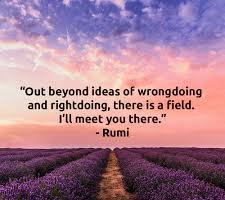One Chick's Journey
What I've Learned Along The Way
Navigating Our Journey...
In a world filled with diverse thoughts, cultures, and experiences, conflicts and misunderstandings can often arise. Whether in our personal relationships or global conversations, disagreements are a natural part of our human existence. However, within this intricate web of differing viewpoints, many of us share a deep longing for unity and mutual understanding, all while remaining true to our core values. The ancient wisdom of the Persian poet Rumi may offer some guidance. He once beautifully expressed, "Out beyond ideas of wrongdoing and rightdoing there is a field. I'll meet you there.”
Just beyond the concepts of right and wrong, there exists a place where we can connect...This isn't just a poetic idea; it's an invitation to rise above our differences and come together with respect.
To truly understand Rumi's message, we need to explore the notions of "wrongdoing" and "rightdoing" in a simpler way. At a glance, "wrongdoing" appears to be actions that go against our inner values or societal norms, while "rightdoing" represents actions that align with our moral compass. However, in the complex world of human relationships, these definitions are rarely clear-cut. The beauty and complexity of being human lie in our subjective experiences, which lead to various interpretations of right and wrong. It's within this intricate spectrum that Rumi's place exists—a space that transcends rigid classifications, offering a haven of understanding, empathy, and respect.
Understanding this concept and putting it into practice creates two distinct challenges. Bringing it to life requires more than mere hope; it calls for active engagement. It encourages us to actively seek out perspectives that differ from our own and to listen even when faced with views that challenge our deepest beliefs. It's a call to nurture a culture that not only tolerates but celebrates the rich tapestry of human experiences and expressions.
Another profound insight that sheds light on our shared journey comes from Ram Dass, a spiritual teacher, who once shared, "We are all simply helping each other find our way home." This meaningful statement emphasizes our interconnected paths. It suggests that beyond our individual stories lies a collective journey of growth, discovery, and eventual unity. Every encounter, whether harmonious or conflicting, is a chapter in this grand tale of human evolution.
Life, with its multitude of experiences, perceptions, biases, and past experiences, shapes our worldview. Yet, by embracing the idea of 'helping each other find our way home,' we embark on a transformative path. We begin to realize that every person we meet has a unique story, valuable lessons to share, and wisdom to impart. Our interactions move beyond transactions and grow into meaningful connections with the potential for transformation.
The challenge and opportunity before us are twofold. First, it's about not just seeking Rumi's mythical place but actively nurturing it in our daily interactions. Second, it's about embodying the spirit of this place in our global perspective—building a world where understanding and love are at the forefront. A world where, amid the remarkable diversity, we recognize our shared humanity.
As we journey together through this shared adventure, let our steps be guided by compassion, respect, and open hearts. In the grand symphony of life, our various melodies, whether harmonious or discordant, come together to create a beautiful song of unity, reminding us that, ultimately, we are all helping each other find our way home.
May Your Journey Be Blessed,
Natalie
